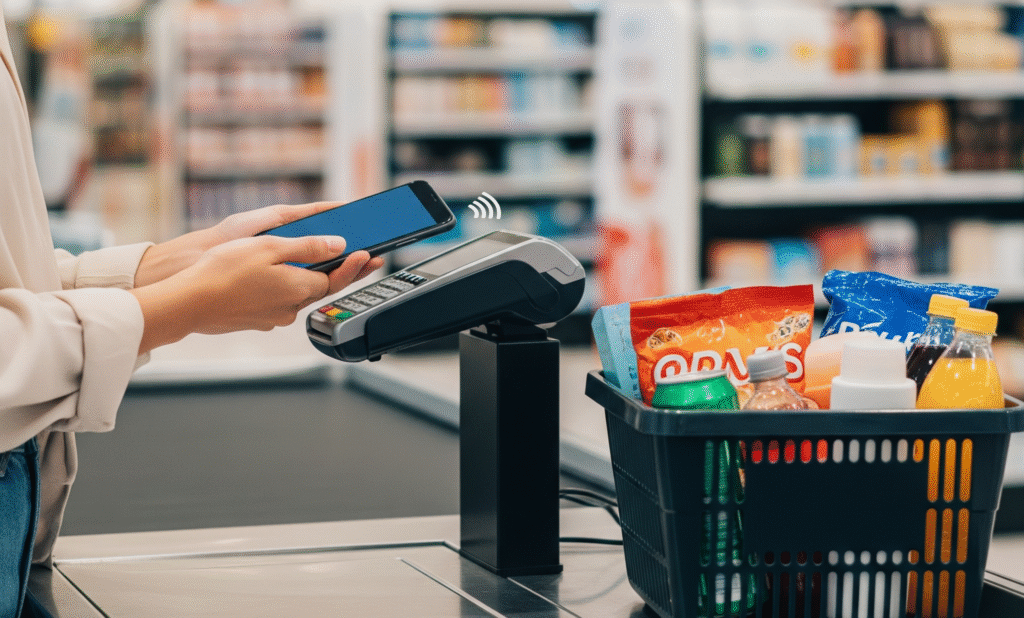
1. Introduction: The FMCG Growth and the Rise of Fintech
The fast-moving consumer goods (FMCG) industry thrives on speed, volume, and convenience. But as digital adoption accelerates, fintech in FMCG growth has emerged as the backbone for sustainable expansion.
From empowering small retailers with instant credit to enabling consumers with contactless payments, fintech has transformed how FMCG businesses operate. Global FMCG giants and local distributors alike are now leveraging fintech to drive efficiency, transparency, and profitability (World Economic Forum).
2. What Is Fintech in FMCG?
Fintech in FMCG growth refers to the integration of financial technology—such as digital payments, embedded finance, micro-lending, and blockchain—into the FMCG ecosystem.
It bridges gaps between:
- Manufacturers and distributors (faster settlements)
- Retailers and wholesalers (credit access & invoice financing)
- Consumers and brands (cashless convenience & loyalty apps)
3. Why Fintech Is Driving FMCG Growth
Faster Payments and Digital Transactions
Fintech enables seamless digital transactions across FMCG distribution networks. Whether it’s QR payments at a rural store or instant UPI transfers, digital fintech solutions ensure cash flow liquidity, which is vital for FMCG expansion.
Supply Chain Financing for FMCG Brands
Delayed payments often disrupt FMCG supply chains. Through supply chain financing, fintech platforms allow manufacturers and suppliers to receive payments instantly while retailers enjoy flexible credit.
Credit and Micro-Lending for Retailers
One of the biggest barriers to FMCG growth is retailer liquidity. Fintech for retail has opened doors to micro-loans, enabling small shops to stock more products, boost sales, and strengthen FMCG distribution.
Data-Driven Insights for FMCG Distribution
Fintech solutions provide real-time financial analytics, helping FMCG companies track demand, optimize inventory, and forecast cash flow accurately.
4. Benefits of Fintech in FMCG Growth
- Increased efficiency – faster settlements and reduced paperwork
- Stronger retailer networks – through credit access and loyalty rewards
- Enhanced transparency – blockchain-backed records of transactions
- Customer convenience – with contactless and mobile-first payments
- Sustainable scalability – enabling FMCG brands to penetrate new markets
5. Traditional vs Fintech-Driven FMCG Operations
| Aspect | Traditional FMCG | Fintech-Driven FMCG |
|---|---|---|
| Payments | Cash-based, delays in settlement | Instant digital transactions |
| Retailer Financing | Informal credit, limited options | Micro-loans & supply chain financing |
| Transparency | Manual records, prone to errors | Blockchain & digital dashboards |
| Customer Experience | Cash dependency | Contactless & mobile payments |
| Growth Opportunities | Slow, limited by capital | Scalable with fintech integration |
This shift highlights why fintech in FMCG growth is no longer optional but essential.
6. Real-World Examples of Fintech Transforming FMCG
- Unilever partnered with fintech startups to provide working capital loans to small retailers in emerging markets.
- Coca-Cola uses fintech-driven mobile wallets in Africa to streamline distributor payments.
- Nestlé integrated fintech-based supplier financing to ensure smooth operations during supply chain disruptions.
- FMCGPay ( About Us ) is reshaping how FMCG brands manage digital payments and financing for faster business growth.
7. Challenges and Considerations in Adopting Fintech
While fintech is driving FMCG transformation, challenges remain:
- Digital literacy gaps among small retailers
- Cybersecurity risks in financial transactions
- Regulatory hurdles in certain markets
- Adoption costs for smaller businesses
👉 Overcoming these requires strong training programs, secure fintech platforms, and strategic partnerships with fintech companies.
8. Future of FMCG Growth with Fintech
The next decade will witness:
- Embedded finance becoming standard in FMCG distribution
- AI-powered credit scoring for faster retailer loan approvals
- Blockchain-based supply chain tracking ensuring full transparency
- Digital-first ecosystems making cash obsolete in FMCG retail
As consumer expectations shift toward speed, convenience, and trust, fintech will ensure that FMCG growth remains resilient and inclusive.
9. Conclusion & Next Steps
The evidence is clear: fintech is the new backbone of FMCG growth. By embracing fintech, FMCG companies can unlock:
- Faster payments
- Smarter distribution
- Empowered retailers
- Happier customers
If your FMCG business is ready to step into the future, explore how FMCGPay can help you redefine payments, supply chain financing, and growth strategies. For more details, check our Contact Page.
